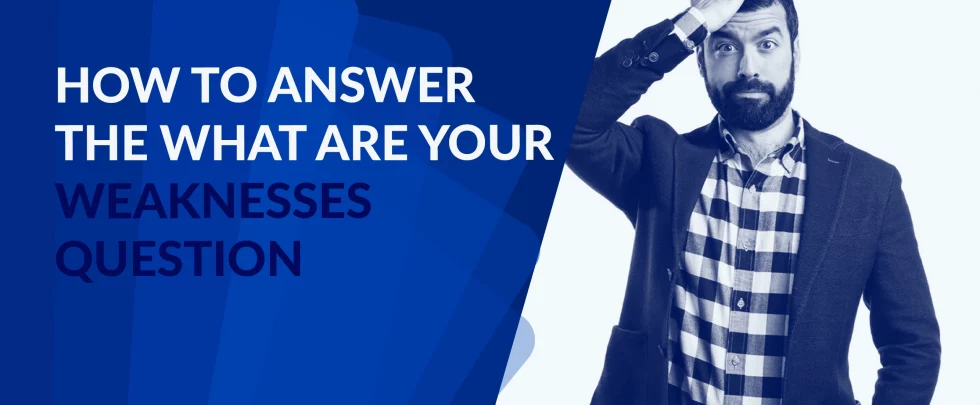We all know that interviews can be stressful and uncomfortable. But there’s one common job interview question that most people dread more than any other hearing from the hiring manager: “What are your weaknesses?”
Answering this common question correctly is incredibly important, so planning ahead and practicing your response is key.
It’s important to remember that the interviewer is not looking for a laundry list of your faults. Instead, they want to know how you recognize and work on improving any weaknesses you may have.
When answering this “what is your weakness” question, focus on qualities that are not essential for the job you’re applying for.
You could take the easy way out and say something like “I work too hard” but your hiring manager has heard this answer countless times, so it won’t help you stand out from the competition.
Even if it looks like a stressful example of a job interview question, no need to worry, you can use it to your advantage.
How? As always we got you covered,
In this article, we’ll share tips on how to answer the dreaded “What are your weaknesses?” question, we will equip you with real weaknesses you can present too!
We’ll cover what not to say as well as some thoughtful ways to frame a response that will impress potential employers.
What Are Your Weaknesses Question: Why Saying Your Weaknesses is Important
Saying your weaknesses in an interview is like admitting to your favorite junk food. It may be a little embarrassing, but it’s also a sign of honesty and self-awareness.
Presenting your weaknesses as honestly as possible does not show your lack of experience or that you have limited experience, on the contrary.
It’s important to remember that no one is perfect, not even when it comes to professional life, and being able to acknowledge and address a real weakness shows that you’re not afraid to take responsibility for your actions and that you’re willing to improve.
Think about it this way, imagine you’re the interviewer and you’ve just finished interviewing a dozen job candidates.
They all seem perfect, like a freshly baked batch of cookies. But then, one of the candidates admits to their weakness and it’s like a sprinkle of salt on the cookie, it makes it more interesting and authentic.
It sets them apart from the rest and makes them stand out.
As you know “What is your weakness” is one of the top common interview questions. It also shows that you’re not afraid to be vulnerable and that you’re aware of your limitations.
It’s like admitting to a therapist that you have a problem, it’s the first step to solving it. And let’s be honest, who wants to work with someone who thinks they’re perfect?
Plus, it’s a great opportunity to showcase how you’re working on improving yourself. It’s like going to the gym, it’s not fun, but it’s necessary.
And it shows that you’re proactive and willing to put in the work to improve.
In conclusion, saying your weaknesses in an interview is like admitting to your favorite junk food, it’s a sign of honesty, self-awareness, and willingness to improve.
It sets you apart from the competition and shows that you’re not afraid to be vulnerable, you’re aware of your limitations, and you’re willing to put in the work to improve which is a positive trait.
What Are Your Weaknesses Question: Why Do Interviewers Ask About Your Weaknesses
From the interviewers’ point of view, a question about the biggest weakness in an interview like a detective asking for alibis.
After all, it’s a tricky question but it’s a way to get to know the candidate better, to see if they’re being honest and authentic, and to see how they handle difficult questions.
You’ll be asked this kind of behavioral interview questions before so interviewers use this question to separate the wheat from the chaff, so to speak.
It gives you a sense of who the person really is, how they handle challenges, and how they plan to improve.
So, knowing how self-aware the candidate is, and how they handle criticism will be a deciding factor. It’s like a test, it’s not always pleasant, but it’s necessary.
Also, It’s a way to see if the candidate is a good fit for the company and if they’re willing to put in the work to improve.
Furthermore, it’s a way to see if the candidate can take feedback constructively and if they can use it to grow and develop like a plant, it needs sunlight and water to grow, but it also needs pruning to maintain its shape and strength.
Next, we’ll discuss the strategies for answering the “what are your weaknesses question.
What Are Your Weaknesses Question: Strategies for Answering the “What Are Your Weaknesses” Question
Ok after reading all these explanations we’re pretty sure that the reason part is covered well and let’s cover the strategy part, shall we?
So, keep reading for the important part of the topic if you like to know how you should go about answering this question, we have got some tips for you!
Honesty is crucial
This will sound like a cliché but it’s true, honesty is the best policy when it comes to answering this question.
At InterviewJoy we give consultation for job seekers and when it comes to answering this question during our mock interviews, some candidates think that they can get away with lying or exaggerating their weaknesses.
But the truth is, interviewers are experienced and they can easily spot a lie when it comes to identifying the ideal candidate.
How? Well, actually it’s simple. Most of the time you recognize that they are taking notes while you’re answering behavioral interview questions right?
So, they will come up with different questions but ask the same thing which confuses the candidate and they will be able to tell if you’re lying or not.
So, it’s better to be honest and open about your weaknesses and show that you are aware of them and willing to work on them.
Being honest shows that you’re self-aware and that you’re willing to take responsibility for your actions.
Also an extra tip for you; you can always focus on your weaknesses that are not related to the job you’re applying for so start thinking about them.
Try to be specific
When talking about your weaknesses, try to be specific and focus on those that are related or not relevant to the skills needed for this job.
This way, you will show the interviewer that you are self-aware and able to recognize your areas of growth so, instead of giving a general answer, be specific about your weakness.
For example, instead of saying “I’m not very organized,” say “I have struggled with time management in the past, but I have been working on implementing a daily schedule to better prioritize my tasks.”
See! That’s much better, right?
Show how you’re working on improving
When discussing your weakness, make sure to also mention what steps you’re taking to improve.
You can use this opportunity to showcase how you’re working on improving your weaknesses. For example, if you struggle with public speaking, explain that though it’s been a challenge for you in the past, you’ve been taking some classes and are now a much more confident speaker.
Or, if you consider yourself a quick learner, point out that while there may be some aspects of the job that aren’t quite within your wheelhouse yet, they won’t stay that way for long as you have the ability to pick up new skills quickly.
This shows that you’re proactive and that you’re willing to put in the work to become a better professional.
Choose a minor weakness
So, we hope you feel less intimidated by this question now.
Don’t worry if you freeze up when someone asks, “What are your weaknesses?” We all have them. The key is to choose a minor weakness that won’t be detrimental to your job performance.
For example, let’s say you’re not great with numbers, but your job doesn’t require any complex calculations. So it makes sense to choose this type of weakness as it won’t be viewed as a major setback by the interviewer.
Another good strategy is to pick something that might actually end up overlapping with what the company needs.
As you see, picking the right kind of weakness is the key here. Try not to choose anything too critical or something that could prevent you from doing your job successfully–like poor time management or communication skills.
Turn it into a positive
Another great way to answer “What is your biggest weakness” is by using positive weaknesses which are actually strengths in disguise.
For example, if you have a success story associated with overcoming a particular weakness, it can be an excellent idea to use this as your response.
So, instead of saying “I’m not great at public speaking,” you could say “I used to be really nervous when it came to public speaking, but I’ve worked really hard on my presentation skills and now I’m much more confident in front of an audience.”
This way, you’re showing the interviewer that you have a growth mindset and are willing to put in the effort to improve. So, it’s a great way to turn a potential weakness into a strength.
Practice beforehand
It’s always a good idea to practice answering this question before the interview.
Knowing your weaknesses is an important factor in the interviewing process and helps you impress the hiring team by being self-aware.
Doing mock interviews or researching sample answers can help you figure out which weakness is minor enough to bring up, and allow you to show that you have taken strides to become better.
Preparing examples of how your weaknesses have either been positive in terms of learning from your mistakes or how they can be viewed as a strength with more information can help you answer this question with confidence.
Overall, it’s important to remember that everyone has weaknesses right?
You only need to show that you are aware of your weaknesses and have taken steps to improve upon them will make you stand out as a strong candidate.
What Are Your Weaknesses Question: Sample Answers for Weakness-Related Questions During an Interview
Ok, we almost covered it all. Now let’s look at some sample answers for the “What are your weaknesses” question.
This section will equip you with real weakness examples, along with sample answers you can use. Yaay!
Time management
Time management is a common weakness that many people struggle with. If you think this is your weakness, you can mention it in the interview and explain how you are working on improving it.
For example, you can say:
“I have a tendency to procrastinate, but I’m working on it by setting deadlines for myself and breaking down large tasks into smaller, manageable chunks. It’s like trying to eat an elephant, one bite at a time.“
Good one right?
Public speaking
Public speaking is another weakness people struggle with. It can be a difficult skill to master, and it’s a common weakness for many people.
So if this is your weakness, you can mention it in the interview and explain how you are working on improving it. For this, a sample answer would be:
“I used to be very nervous when speaking in front of large groups, but I have been taking public speaking classes and practicing my presentation skills. I’m getting more comfortable with it every day.“
Or, you can also say:
“I get a little nervous when it comes to public speaking, but I’ve been working on it by joining a toastmasters club and practicing in front of friends and family. It’s like taking a cold shower, it’s not pleasant but it’s good for you.“
Perfectionism
This one is a bit tricky because many candidates try to use this as a weakness example and they end up sounding like they are bragging.
So, if perfectionism is your weakness, you can mention it in the interview and explain how you are working on improving it.
It can be difficult to balance striving for excellence while also allowing yourself to make mistakes and learn from them.
If this is your weakness, you can mention it in the interview and explain how you are working on improving it.
For example, you can say:
“I have a tendency to be a perfectionist, but I’m working on it by setting realistic goals and allowing myself to make mistakes. I’m learning that it’s okay to make mistakes as long as I learn from them.“
Or perhaps,
“I have a tendency to be a perfectionist, but I’m learning to let go and accept that sometimes good enough is good enough. It’s like trying to catch a butterfly, if you hold on too tight, you’ll crush it.“
Delegation
Delegation is another common weakness for many people, as it can be difficult to let go of control and trust others to do the job.
You know the drill, if this is your weakness, you can mention it in the interview and explain how you are working on improving it.
For example, you can say:
“I used to struggle with delegation because I wanted to make sure everything was done perfectly. But I’m learning to let go and trust others to do the job. It’s like riding a bike, you have to learn how to balance before you can move forward.“
Another alternative is:
“Delegating is a challenge for me, as I prefer to do everything myself. But I’m learning to rely on others and assigning tasks. It’s like trying to juggle too many balls at once, so you need to let some go.“
Being too critical
Another example of a weakness is being too critical. It can be difficult to balance constructive criticism with being overly critical of yourself and others.
Therefore, if this area is challenging for you, discuss it in the interview and outline how you are striving to enhance it.
For example, you can say:
“I used to be too quick to judge, but now I’m learning to give constructive feedback and be more understanding. It’s like learning to play a musical instrument, you have to practice and be patient with yourself.”
Or perhaps:
“I can be a little too critical, but I’m working on it by practicing positive self-talk and giving constructive feedback. It’s like trying to balance a scale, you need to put in the same amount of positive and negative weight.”
What Are Your Weaknesses Question: Bottom Line
The bottom line is that you should be honest and open about your weaknesses and frame them in a positive way so that the interviewer can see how you aren’t just aware of your own deficits, but actively looking for ways to fix those issues.
Explain how you are working on improving them and provide examples of how you are striving to enhance them. This will show the interviewer that you are self-aware and willing to learn from your mistakes.
Also, when you’re asked to list your weaknesses in a job interview, don’t try to hide them away.
Doing this will show that you are self-aware, hardworking, and willing to put in the effort to get better.
After all, knowing how to answer “What Are Your Weaknesses” is an important skill for any job seeker, and knowing it well can help you make a great impression on any potential employer.
We hope you enjoy reading this article. As you know at InterviewJoy, we are here to help you ace your job interviews. You can always check our top-rated interview guides to get the best advice and support.
See you in the next informative article. Good luck!


